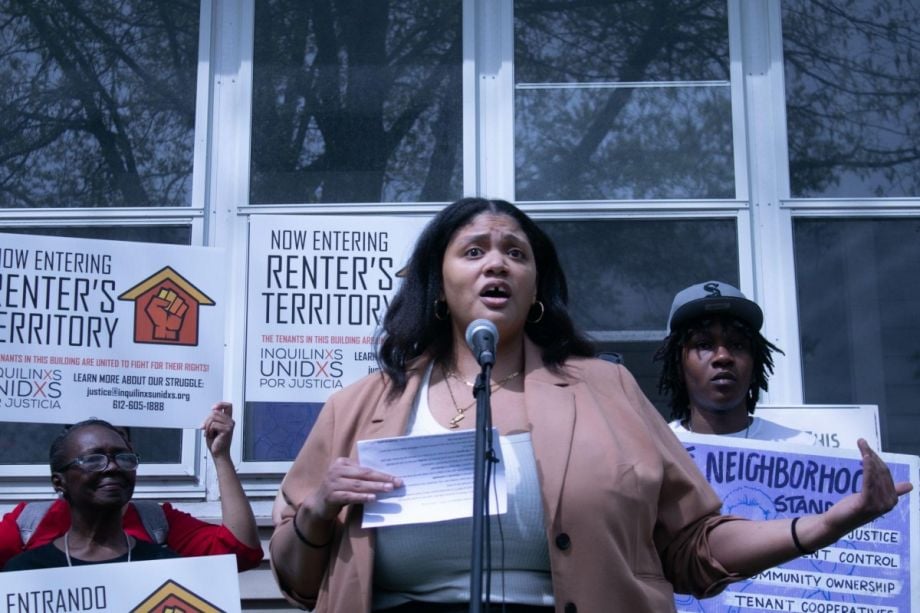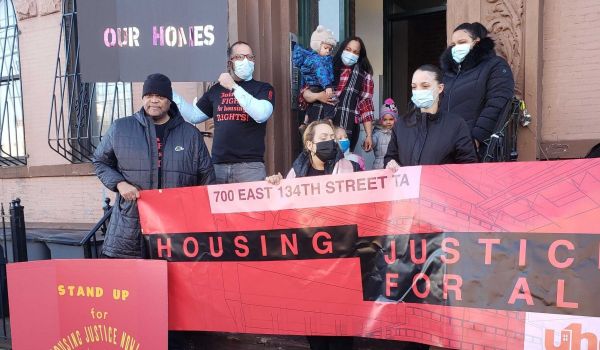When Rachel Jones began renting a single-family home in Minneapolis in 2019, it didn’t take long for problems to start. Within months of moving in, her basement had flooded. Under the water was a live electrical wire.
“I don’t need a flooding basement with electrical wires going through the water when I have little kids that can potentially go down there,” says Jones, a single mother of two children.
She called the company from which she rented her homes — a large corporate entity named HavenBrook, now called Progress Residential after several corporate buyouts.
When Jones asked HavenBrook for help, she had trouble getting through to a human being. After getting the runaround and speaking to four separate people, she was told that an emergency request would be written up. Jones assumed that meant there was someone local in Minneapolis with whom the company would contract to assist her. But days went by without any help or any contact from HavenBrook.
“An emergency request just goes into like some email, but they check it very leisurely,” she says she later realized. A week later, when someone from the company finally called and offered to come by to help, the water had dissipated and the damage was done. Her questions about preventing future flooding went unanswered.
Things did not improve for Jones when HavenBrook was swallowed up by a company called Front Yard Residential, which was subsequently bought by a company called Pretium Partners in 2020. Pretium, a private equity firm based in New York, is the second-largest corporate landlord of single-family homes across the country and owns about 600 single-family homes throughout the Twin Cities metro area.
Even as her rent has gone up by hundreds of dollars, Jones says that water has been seeping in from the corners of her kitchen floors. After Pretium failed to fix the issue, Jones and other North Minneapolis tenants began putting their rent into escrow, a process by which courts accept rent rather than landlords and then pay it back to tenants if repairs are not made.
Jones began the escrow payments in March and was awarded her first two months of rent by the court. Her rent for May and June is still with the court because Pretium, which had finally addressed some repairs, still did not fix the leaking floor. In total, seven tenants of Pretium homes in North Minneapolis have begun escrow cases.
Tenants say their hedge fund landlord has repeatedly failed to address major issues including mold, lead paint, flooding, insect infestations and electrical problems, leading to health problems for their families. The rent escrow strategy and other activism in response to Pretium’s neglect and unresponsiveness in Minneapolis represents one of the largest organizing campaigns in the country directed at private equity owners of single- family homes. The local tenant advocacy group Inquilinxs Unidxs Por Justicia (United Renters For Justice) says tenants from about half of Pretium’s 200 homes in North Minneapolis have attended the organization’s meetings.
They are also the only group of tenants of single-family homes who have coordinated a campaign to put rent in escrow, according to Jordan Ash, campaign and research director for the Private Equity Stakeholder Project.
This month, they’ve ratcheted up their efforts.
On June 17, several dozen tenants of Pretium homes joined organizers with Inquilinxs Unidxs Por Justicia to hold a rally outside Pretium’s office in New Brighton, a suburb outside of Minneapolis.
“No more roaches, no more rats, no more landlords getting fat!” tenants chanted. Ralliers held up signs reading “no private equity” and “black renters matter,” and taped photos of their broken pipes and other deteriorating conditions to the building’s brick exterior and windows. One tenant, a single father named Jimmy Harris, said the heating was not working as soon as he and his two children moved into their home. A tenant named Ariana said she experiences depression and anxiety after years living in a home with neglected repairs owned first by HavenBrook and now by Pretium.
The tenants presented the company with a list of demands, signed on by 68 different tenants of Pretium’s homes in North Minneapolis. Those demands include a rent freeze, financial restitution, a promise from Havenbrook to pay all costs for relocating, and right of first refusal if their homes are sold. Pretium representatives refused to speak with organizers at the rally.
Private equity has been on a spending spree, snatching up single-family homes for the past decade. After the 2008 financial crisis, corporate landlords began to gobble up foreclosed homes, aided by Fannie Mae and Freddie Mac. By 2016, Fannie and Freddie auctioned 95 percent of their distressed housing stock off to corporate landlords with low-interest loans, according to a New York Times analysis. Corporate landlords now own about 350,000 homes across the country,a report from the Action Center on Race and the Economy (ACRE) found. Pretium alone owns 55,000 of these homes. Across the country, rents in single-family homes have increased 13% between May 2021 and May 2022, ACRE said.
In Minneapolis and St. Paul, 4.1% of single-family homes and condos were owned by investors in 2021, up from 1.8% in 2006, according to a report from the Federal Reserve Bank of Minneapolis. The neighborhoods with the most investor-owned properties also had unusually high poverty rates, the report found. As with other forms of private equity, cutting costs and reducing staffing are built into the business model, as companies typically take out massive debt which they must pay back.
Pretium in particular has become notorious for skimping on basic repairs. A survey by IX of residents of the former Havenbrook homes found 35% had plumbing, leaks, flooding or other water issues. Some tenants went without heat or hot water for weeks.
In February, Minnesota Attorney General Keith Ellison sued Pretium and its many shell companies over a failure to keep homes suitable for habitation as well as for frequently filing evictions in defiance of the federal eviction moratorium. The lawsuit lists repair requests filed by tenants, including a furnace that had not been working on and off for two years, a front door handle that fell off, a wild animal inside a tenant’s wall, toilets that did not flush, leaks and lack of hot water.
The lawsuit also alleges that Pretium misrepresented its business by stating that it provides “24/7” and “same day” repair services, when in reality tenants have waited weeks for repairs. Between 2015-2020, the City of Minneapolis found 960 health and safety violations in homes owned by Pretium, the suit states. In nearby Columbia Heights, violations reached such a level that the city revoked the company’s rental license. Despite this, Pretium CEO Donald Mullen boasts on the company’s website that the organization is one “where you wake up in the morning feeling good about yourself.”
Ash, from the Private Equity Stakeholder Project, says these tenants of single-family homes in North Minneapolis are among the most organized across the country. “I think the level of organizing is larger, they’ve been at it for about two years,” he says.
Ash says a successful strategy to address private equity ownership has been to intervene when pension funds want to invest in the companies. When Minnesota was deciding whether to re-invest its public employee pension fund in Landmark Investment Group - an investor with Pretium - Inquilinxs Unidxs Por Justicia organized tenants to speak about their treatment at the hands of the company. It led to protracted negotiations between tenants and Pretium, although those negotiations ended once the attorney general’s lawsuit began.
In the short term, tenants are seeking repairs and better communication from Pretium. But two years ago, Inquilinxs Unidxs Por Justicia helped organize another group of tenants’ high-profile purchase of a Minneapolis apartment building. Some tenants are now hoping Pretium could be pressured to sell some of their homes to them. At the rally at Pretium’s offices, tenants chanted, “R-E-S-P-E-C-T, my home should belong to me” and “we deserve a slice of the pie, give us all a chance to buy.”
Jones says she pays about $1,259 a month for her home, between rent and service fees. She estimated that if she owned the house, her mortgage and property taxes would come out to around $1,000.
Jones’ escrow case is ongoing. “I still talk to my lawyer for that case every other week,” she says. Since Jones began banding together with other tenants, Pretium has been quicker to respond to her complaints and it has been easier to get a human on the other end of the phone. She also says she feels less isolated in her struggle.
“Connecting with other tenants in this way, it is life changing, because you’re not alone and we can support one another,” she says. “We can…advocate for ourselves and eventually for other people who are renting from other corporate landlords.”
This article is part of Backyard, a newsletter exploring scalable solutions to make housing fairer, more affordable and more environmentally sustainable. Subscribe to our weekly Backyard newsletter.

Roshan Abraham is Next City's housing correspondent and a former Equitable Cities fellow. He is based in Queens. Follow him on Twitter at @roshantone.


















